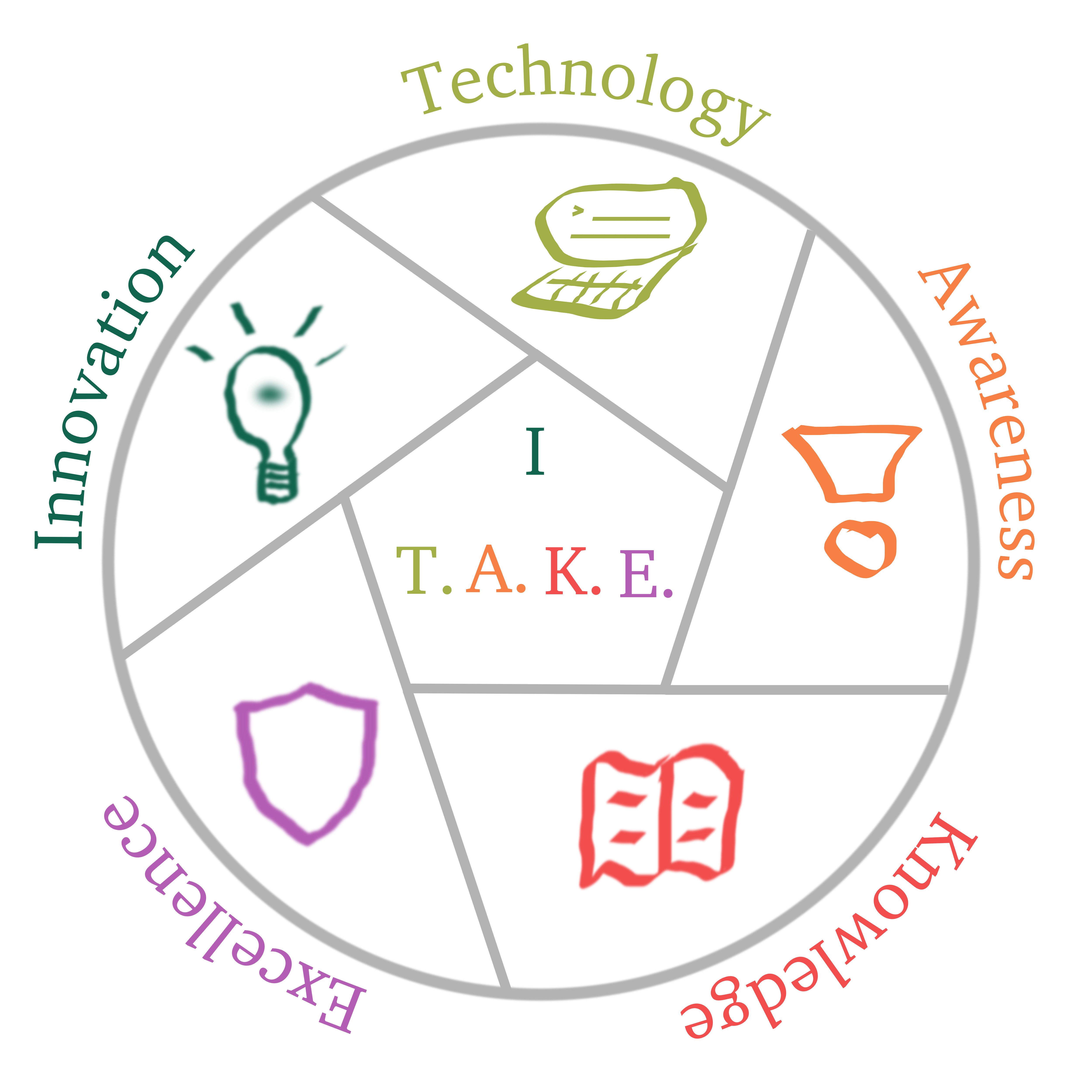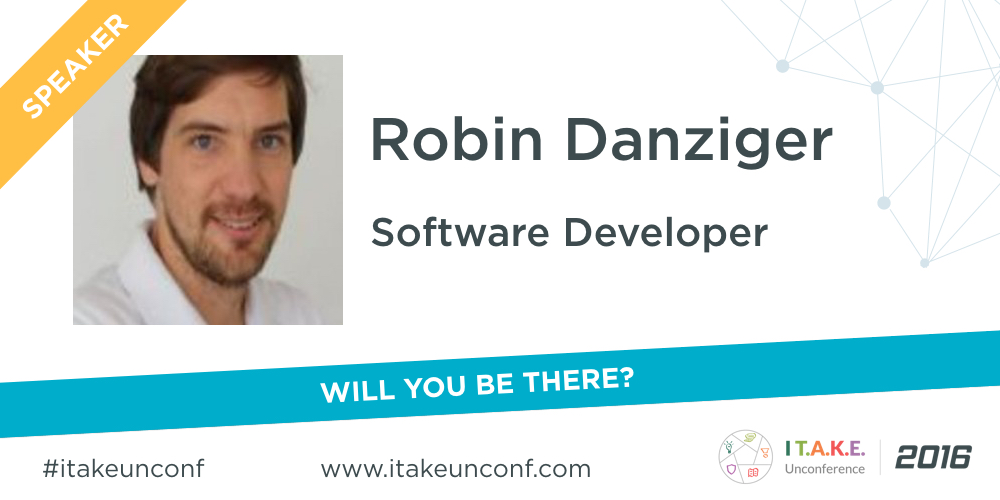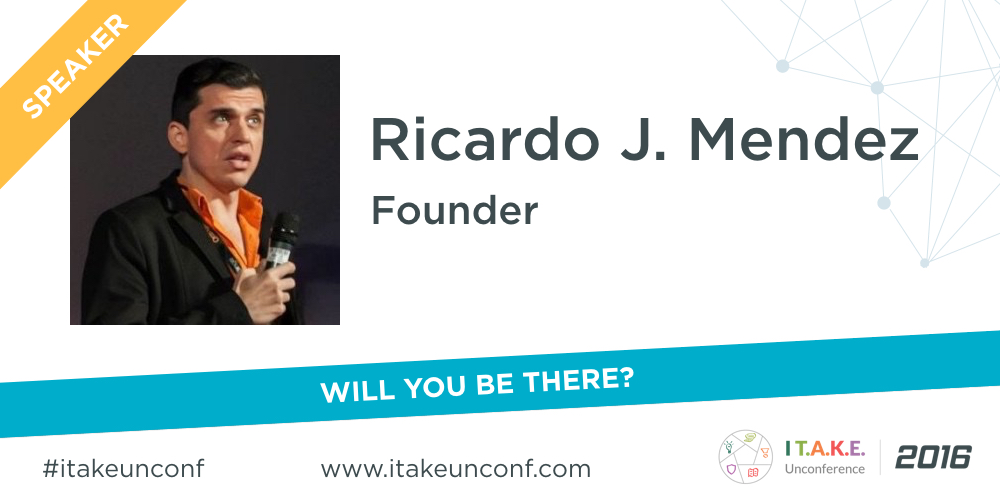 Announcements
Announcements
Immutable data
Enjoy the following series of interviews with the speakers, top-notch software crafters from across Europe, joining I T.A.K.E Unconference, Bucharest, 19-20 May. Discover the lessons learned and what drives them to challenge the known path in their field.
Ricardo J. Mendez, founder at Numergent, is a software developer with 20 years of practice. He will share in his talk at I T.A.K.E Unconference 2016 more about immutable data.
#1. SHARE TOP 5 THINGS YOU DID THAT HELPED YOU GROW & BECOME THE PROFESSIONAL YOU ARE TODAY
Realizing that, as a developer, your job is not to deliver code. Your job is to keep the user happy, and delivering code is only a part of that. It requires a mental shift from the technology-focused mentality one tends to have as an engineer.
#2. What challenges will the participants find solutions to during your session at I T.A.K.E Unconference 2016?
A shift in mentality towards data immutability, whatever the language we are using, will help structure the code and functionality in a way that makes it easier to grow and change down the road.
#3. What else would you like to share with participants ?
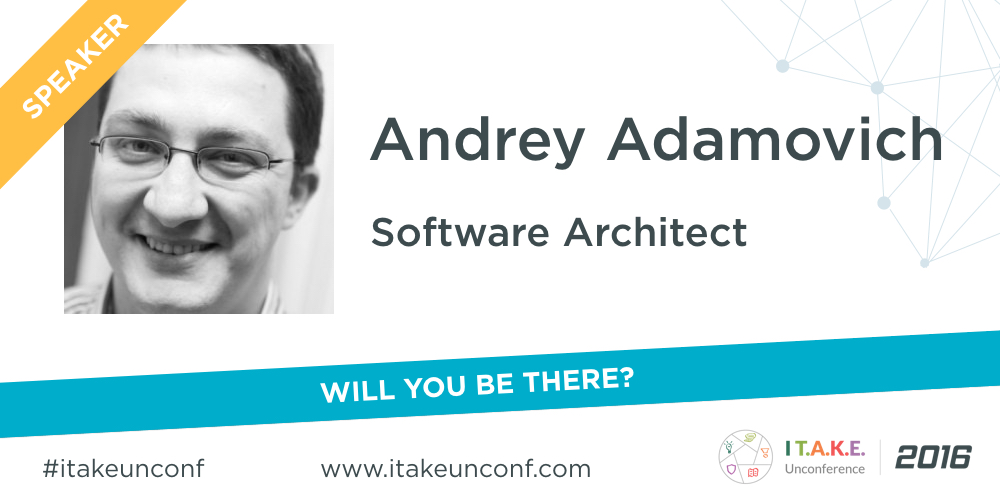 Announcements
Announcements
Patterns for infrastructure-as-a-code & Visualizing codebases
Enjoy the following series of interviews with the speakers, top-notch software crafters from across Europe, joining I T.A.K.E Unconference, Bucharest, 19-20 May. Discover the lessons learned and what drives them to challenge the known path in their field.
Andrey Adamovich, Software Architect at Aestas IT, is a software craftsman with many years of experience in different lifecycle phases of software creation. At I T.A.K.E Unconference 2016, he will share more patterns for infrastructure-as-a-code and visualizing codebases.
#1. Share with us 5 things you did that helped you grow & become the professional you are today
- Leaving my first workplace, where I have worked for 5 years
- Becoming an active public speaker
- Co-organizing local communities and conferences
- Developing open-source libraries
- Writing a book
#2. What challenges will the participants find solutions to during your session at I T.A.K.E Unconference 2016?
Visualizing codebases: Seeing big picture in a big code base with simple tools
Patterns for infrastructure as code: Give some hints on how to improve quality of “infrastructure-as-code”
#3. What else would you like to share with participants
Developer | Entrepreneur | Open-source Enthusiast | IoT Player | DevOps Believer | Visualization Lover
Want to join Andrey and many more software crafters from around Europe?
Join I T.A.K.E Unconference 2016!
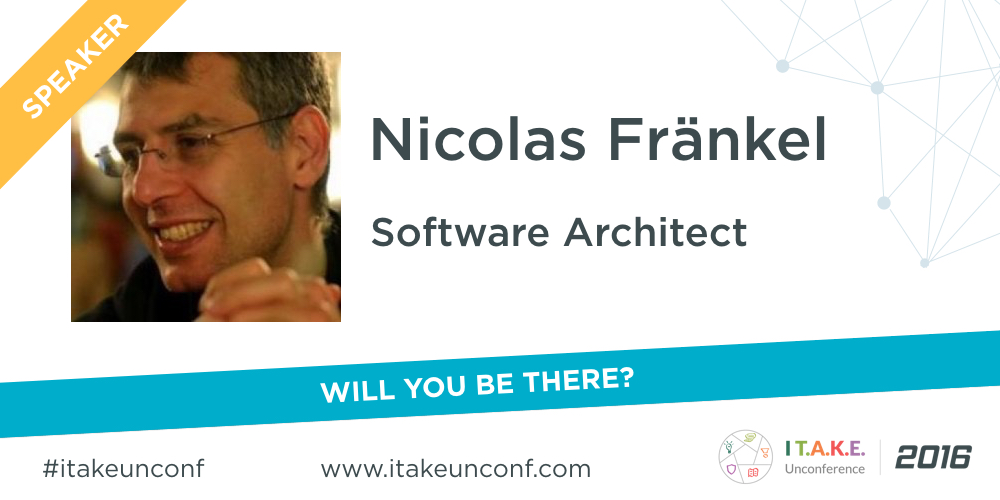 Announcements
Announcements
Mutation testing
Enjoy the following series of interviews with the speakers, top-notch software crafters from across Europe, joining I T.A.K.E Unconference, Bucharest, 19-20 May. Discover the lessons learned and what drives them to challenge the known path in their field.
Nicolas Fränkel, Software Architect with 15 years of experience in a wide range of contexts, University teacher, experienced trainer and book author will join as speaker I T.A.K.E Unconference 2016. In his talk, he will explain how Code Coverage is computed and what its inherent flaw is. Afterwards, he will describe how Mutation Testing works and how it helps pointing out code that is tested but leave out corner cases.
#1. SHARE TOP 3 THINGS YOU DID THAT HELPED YOU GROW & BECOME THE PROFESSIONAL YOU ARE TODAY
- I chose to become a programmer, because during my architectural studies, there was a course on POV-Ray, a ray-tracing software where scenes are described with a language
- I now avoid not well-understood bash commands after trying to execute a find with exec rm command on a production server and starting deleting the server’s filesystem
- I value knowledge sharing since I started teaching a very long time ago
#2. WHAT CHALLENGES WILL THE PARTICIPANTS FIND SOLUTIONS TO DURING YOUR SESSIONS @ I T.A.K.E UNCONFERENCE 2016?
#3. WHAT ELSE WOULD YOU LIKE TO SHARE WITH PARTICIPANTS?
Want to join Nicolas and many more software crafters from around Europe?
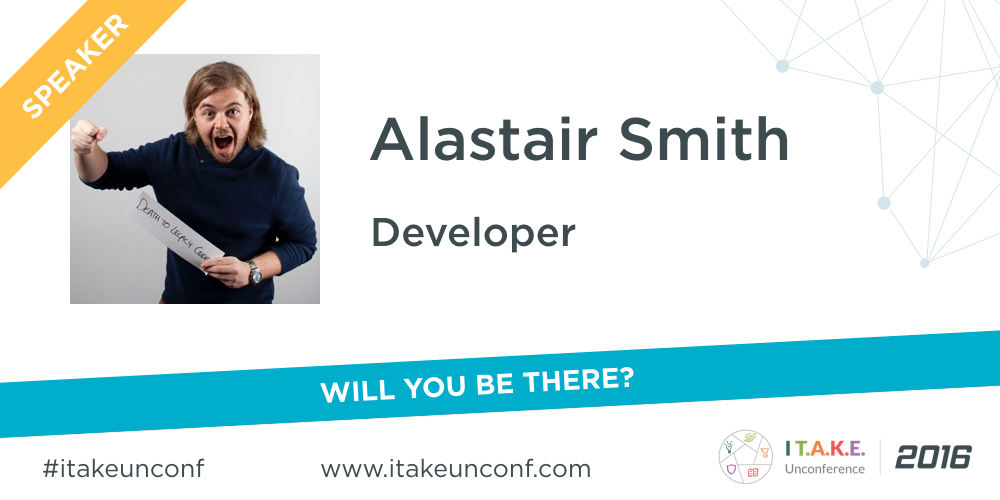 Announcements
Announcements
Test-Drive your Database & the 4 Rules of Simple Design
#1. SHARE TOP 5 THINGS YOU DID THAT HELPED YOU GROW & BECOME THE PROFESSIONAL YOU ARE TODAY
- Reading software development books hungrily in the first few years of my career. Texts such as Code Complete and especially The Pragmatic Programmer and Test-Driven Development by Example were hugely influential on my early career and the direction I chose to take. The Pragmatic Programmer in particular is worth re-reading: I didn’t fully understand some parts of it as a fresh graduate joining the industry, and the experience I’ve built up over the last ten years has allowed me to get more from it on each later reading.
- Attending developer meetups, user groups, and conferences. Aside from the knowledge gained from the talks and workshops run at these events, they’re an invaluable opportunity to meet other developers, learn from their experiences, and about the local software industry.
- Finding a good mentor. As it turned out, my mentoring was very unofficial: a former colleague of mine guided me in the ways of professional software development, and pointed me in the direction of books, blogs, and other resources to learn from. His advice was invaluable in helping me discover techniques for writing good tests (and why tests are important), the importance of refactoring, and the foundational principles of Object-Oriented Design, such as SOLID. All of this at the beginning of my career, in an environment where I wouldn’t have otherwise been exposed to such topics.
- Understanding people as well as tech. As technical people, we can often be quite blinded to the problems around us and focus on the tools and technologies rather than the underlying collaborations with other people.
- Applying principles I’d learned elsewhere to my profession. I play a lot of music, and have been for over 20 years; as such, the idea of deliberate practice is quite a familiar one to me, and applying this principle to the techniques used in software development made a lot of sense. Participating in and organising things like Dojos and Code Retreats has helped me understand and improve my own development process enormously.
#2. WHAT CHALLENGES WILL THE PARTICIPANTS FIND SOLUTIONS TO DURING YOUR SESSIONS @ I T.A.K.E UNCONFERENCE 2016?
#3. WHAT ELSE WOULD YOU LIKE TO SHARE WITH PARTICIPANTS?
Want to join Alastair and many more software crafters from around Europe?
 Announcements
Announcements
How to successfully manage remote teams
Enjoy the following series of interviews with the speakers, top-notch software crafters from across Europe, joining I T.A.K.E Unconference, Bucharest, 19-20 May. Discover the lessons learned and what drives them to challenge the known path in their field.
Hugo Messer, founder of Bridge Global, will join I T.A.K.E Unconference as speaker. In his workshop, the participants will learn more about how to successfully manage remote teams.
#1. SHARE TOP 5 THINGS YOU DID THAT HELPED YOU GROW & BECOME THE PROFESSIONAL YOU ARE TODAY
- Starting my own software development firm, offering IT outsourcing
- Focusing 10 years on growing the company and learning how to grow a company, manage IT projects and people
- Always reading a lot of (management) books to keep educating myself
- I attend conferences and trainings regularly
- The last years I’ve invested in learning how to share my experience and knowledge with others through speaking and training
#2. What challenges will the participants find solutions to during your session at I T.A.K.E Unconference 2016?
During the session they will find out more about:
- common pitfalls within distributed teams > how to make distributed teams work
- communicating across cultures, distance and timezones
- how to apply agile to distributed teamwork
I’ve shared about the session in this video as well.
#3. What else would you like to share with participants
Want to join Hugo and many more software crafters from around Europe?
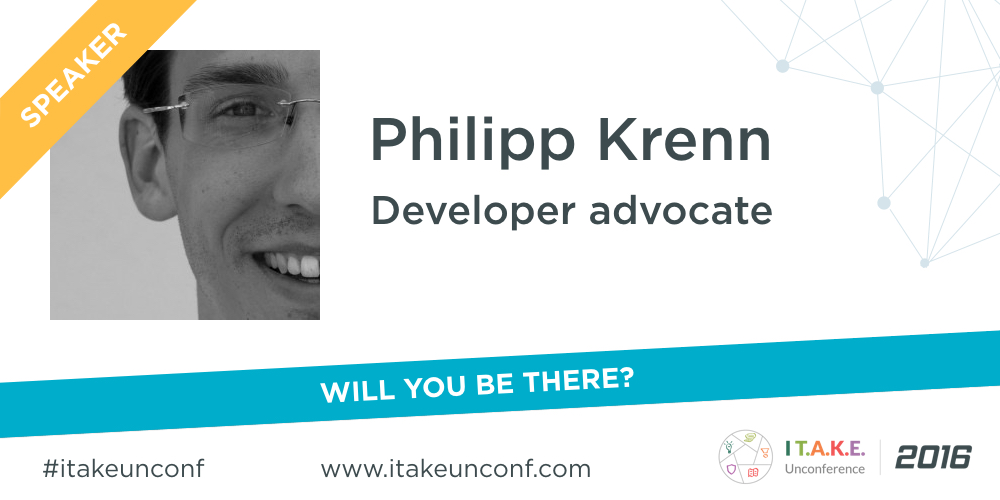 Announcements
Announcements
Ansible, AWS & Elasticsearch
Enjoy the following series of interviews with the speakers, top-notch software crafters from across Europe, joining I T.A.K.E Unconference, Bucharest, 19-20 May. Discover the lessons learned and what drives them to challenge the known path in their field.
In today’s news is Phillipp Krenn, developer advocate @Elastic, who spreads the love and knowledge of full-text search, analytics, and real-time data. During his sessions, the attendees will cover the basics of Ansible by setting up a local environment in Vagrant and explore how Elasticsearch stores and interacts with JSON documents.
#1. SHARE TOP 5 THINGS YOU DID THAT HELPED YOU GROW & BECOME THE PROFESSIONAL YOU ARE TODAY
- Never stop learning: Keep up to date & don’t ignore either tried and tested solutions of the past
- Participate at local events to learn and get to know other people in your field — meetup.com is a great starting point
- Build stuff: Find interesting problems to apply and extend your skills
- Attend at least 1 conference per year to broaden your horizon
- Your dream job or project is just one interview away; there are way more opportunities than you would think at first, just give it a try
#2. What challenges will the participants find solutions to during your sessions @ I T.A.K.E Unconference 2016?
In my Ansible & AWS workshop we will learn how to automate your infrastructure, so you have a reproducible and documented system.
In the Elasticsearch talk we will try to overcome the object-relational impedence mismatch and make developmemt more productive and fun.
#3. What else would you like to share with participants?
The best place to learn more about my experience or ask any question is definitely Twitter – @xeraa
Want to join Phillipp and many more software crafters from around Europe?
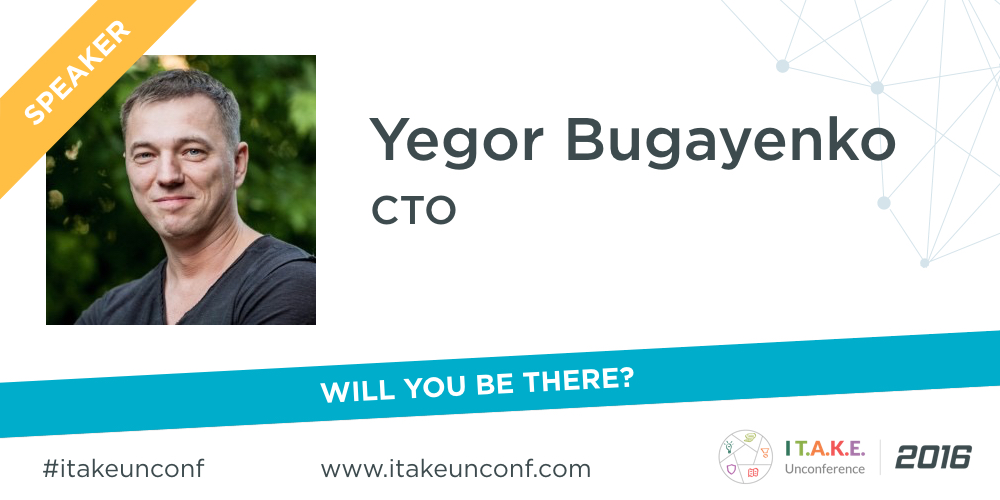 Announcements
Announcements
Chat bots & microservices
Enjoy the following series of interviews with the speakers, top-notch software crafters from across Europe, joining I T.A.K.E Unconference, Bucharest, 19-20 May. Discover the lessons learned and what drives them to challenge the known path in their field.
Yegor Bugayenko, CTO and co-founder Teamed.io, will share in his talk about how chat bots are a more effective way of interaction between web (micro-)services and users than traditional HTML user interfaces.
#1. SHARE TOP 3 THINGS YOU DID THAT HELPED YOU GROW & BECOME THE PROFESSIONAL YOU ARE TODAY
#2. What challenges will the participants find solutions to during your session at I T.A.K.E Unconference 2016?
# 3. What else would you like to share with participants at I T.A.K.E Unconference 2016?
Want to join Yegor and many more software crafters from around Europe?
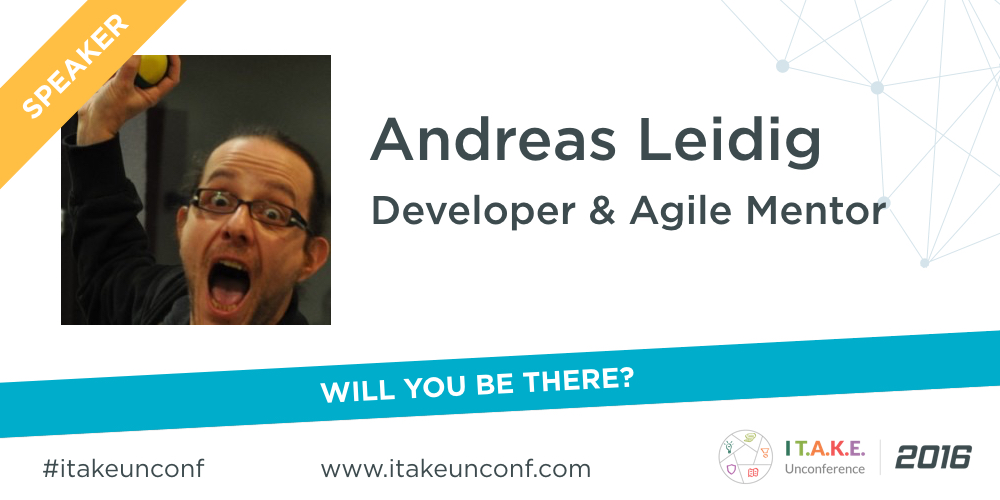 Announcements
Announcements
Mocks are mocking at you?
Enjoy the following series of interviews with the speakers, top-notch software crafters from across Europe, joining I T.A.K.E Unconference, Bucharest, 19-20 May. Discover the lessons learned and what drives them to challenge the known path in their field.
Andreas Leidig, Developer & Agile Mentor MsgGillardon AG, and Robin Danziger, Software Developer, will join I T.A.K.E Unconference 2016 as speakers. They will share in their talk more about mocks and prototypical library for solving this problem in JavaScript: chadojs.
#1. SHARE TOP 5 THINGS YOU DID THAT HELPED YOU GROW & BECOME THE PROFESSIONAL YOU ARE TODAY
Robin:
- Regular participant and speaker at conferences & local user groups
- Coaching teams and organizing internal meetups about software development
- Working with different teams and companies (I’m a freelancer)
- Ask professionals how they would solve a problem
- Try to read the whole internet 😉
Andreas:
- Initiating a conference (SoCraTes)
- Visiting and speaking at conferences
- Listening and questioning my own views
- Working with different teams (during my previous job)
- Thinking outside the box
#2. What challenges will the participants find solutions to during your session at I T.A.K.E Unconference 2016?
Participants will learn about the possible pitfalls and gaps when using mock objects blindly. They will understand that this may lead to decreased safety for refactoring and this weakend trust initiates the need for creating more and more integration tests.
They will see the underlying principles and learn about ways and techniques to escape this trap.
3. What else would you like to share with participants
Robin:
I like to talk about different software development approaches. How can we use and maintain software tests from specifications and end-to-end-tests to unit-tests. And I would like to know how other teams share their knowledge and improve the collaboration inside the team.
Andreas:
Don’t be shy. Open your ears and eyes. Listen and ask.
Want to join Andreas & Robin and many more software crafters from around Europe?
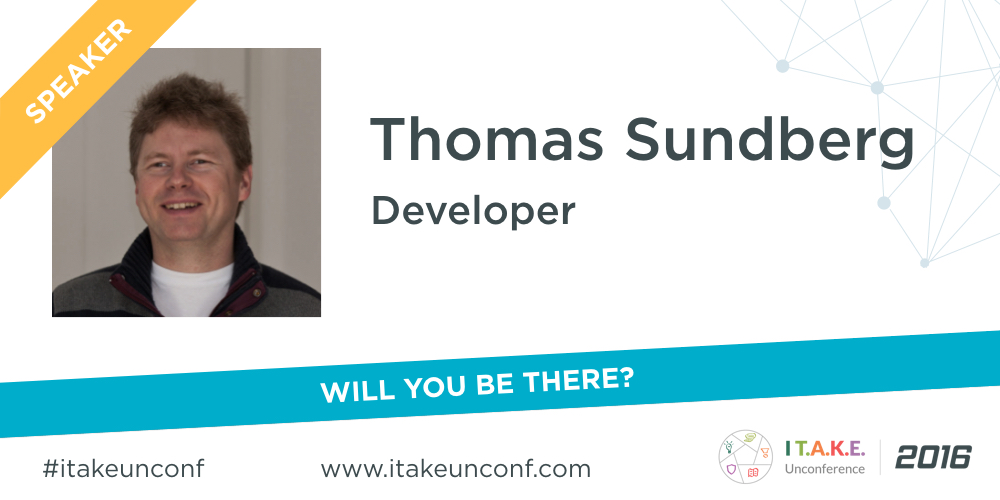 Announcements
Announcements
Users, tests & TDD
Enjoy the following series of interviews with the speakers, top-notch software crafters from across Europe, joining I T.A.K.E Unconference, Bucharest, 19-20 May. Discover the lessons learned and what drives them to challenge the known path in their field.
Thomas Sundberg, developer with more than 25 years of experience, has developed an obsession for technical excellence. This translates to software craftsmanship, clean code, test automation and continuous deployment. At I T.A.K.E Unconference, he will share more about continuous deployment, TDD, and testing.
#1. Share top 5 things you did that helped you grow & become the professional you are today
The five things I am able to come up with now are:
- Automation
- Tidiness
- Teaching
- Speaking at conferences
- Starting my own business
Automation
I have always found it fascinating to automate things.
One of my earliest experiences automating things was with my first PC where I made a boot floppy that booted the system and brought up a word processor. And it only took 1 minute or so. I didn’t really know if this was usable or not, but it was fun.
I wrote code that verified code back in 1997. A colleague of mine asked why. I thought that it was a good idea since I could. It wasn’t formalized like we do today with tools like JUnit, but it was code that verified code.
Automation has also led me to continuous integration back in 2004. This was the time when tools like Cruise Control wandered the earth. Probably hiding from dinosaurs.
Using Cruise Control, Ant and JUnit, I was able to implement continuous delivery at Gamefederation where I worked at the time. I didn’t know it back then, but that is what we call it today.
We had a build that took 20 minutes. It built the system, rebuilt the database, deployed the system and tested that it worked on a freshly setup database.
The testing was so thorough that the operations guy took the artifacts from passing builds and put them straight into production.
When I left Gamefederation, I was told that there had been times when the project manager had been thinking who he should give a task to. Should he give it to the guy leading the developers, we would say lead developer today, or to me. He concluded that if he gave it to the lead developer he would get something back in two hours and a NullPointerException. If he gave the task to me, he would get something back in two days and it would work. One of our differences was that I did unit testing and the lead developer didn’t.
Tidiness
I don’t like a mess. A kitchen sink with lots of unwashed dishes is awful. At the same time, I don’t mind some things being totally out of order. I don’t have to sort the toothpicks at a restaurant. A friend of mine, also into clean code, has told me that he sometimes does this.
The tidiness led me to Clean Code after watching Bob Martin at a keynote at Agile 2008 in Toronto. Hearing him talk about why we prefer clean code over crap was liberating. I bought his book and read it.
Clean code was among my earliest presentations.
Teaching
During an oral exam 1998, before we where even done, I was asked if I could help out as a teaching assistant in a database course. I said yes. This was a start for me where I learned that it is fun and rewarding to teach. Since then I have been working as a teacher and trainer on and off.
Speaking at conferences has enforced this urge to spread knowledge about things I think are important.
Speaking at conferences
Traveling to conferences has been a way to make new connections with people who care about the same things that I care about. That is, clean code, testing stuff, getting code into production and similar things.
I have met new personal friends this way. I have also made business with people I met at conferences.
Starting my own business
I became independent in 2013. This has given me a platform where I can strengthen my possibilities to spread the word about stuff that matters. Not just programming, but also doing it properly.
It took a while before I made the move. It was a scary decision to take. When I started there were a lot of things I was unsure of. Selling and finding assignments, taxes, book keeping just mentioning a few of them.
Running your own company is much more than just writing a few for loops and be done for the day. It is a lifestyle. But it is a lifestyle I enjoy.
#2. What challenges will the participants find solutions to during your sessions at I T.A.K.E Unconference 2016?
I have two sessions at I T.A.K.E. Unconference 2016.
I will show how it is possible to test all paths through a system without using many integrated tests and that it isn’t possible to test all paths through almost any system using integrated tests.
I will also show that it is possible to test all paths using unit tests.
Using some mocking and stubbing in combination with actual unit tests is the way to do this. If we do this properly, we are able to check all paths through the application and will have very few integrated tests.
Definition of done: Working software in production!
This is a case study where I will share how I implemented CD at one client. CD can mean, at least, two different things.
- Continuous Delivery – the system is delivered for use continuously
- Continuous Deployment – the system is deployed into production continuously
The way we did this was to create packages that were possible to install as the main artifact from our continuous integration build. The target was Red Hat servers so RPM packages where a good artifact.
Delivering these packages to a YUM repo allowed us to install them easily.
The last step was to trigger the installation. We used Puppet for provisioning our servers so all we had to do to automate the deployment after a new package was built was to trigger Puppet.
#3. What else would you like to share with participants
I am an amateur musician
I play the trombone in two orchestras: One show orchestra at Stockholm University- KÃ¥rsdraget and A big band – West Side Big Band. This means that I attend regular rehearsals twice a week and sometimes public gigs at dances or concerts.
Cat lover
I have two cats at home. Sune and Gretchen. They are both cats that we have gotten through an agency that helps homeless cats to new homes.
I write a lot
I have a personal goal to write a blog post each month. I wrote a Maven plugin for helping me with my writing. Most blog posts include source code and copying and posting code is error prone. Including part or complete files that compile is less error prone. This has helped me a lot. It fits quite well with my urge to automate things.
Downhill skiing
I had never seen a pair of skis close until I was over 30. Then I joined a few friends and went skiing for a week in France. The first day was horrible. I fell and hurt myself. But after a week with ski lessons I had understood some of the basics. Skiing is a favorite activity today.
Want to join Thomas and many more software crafters from around Europe?
